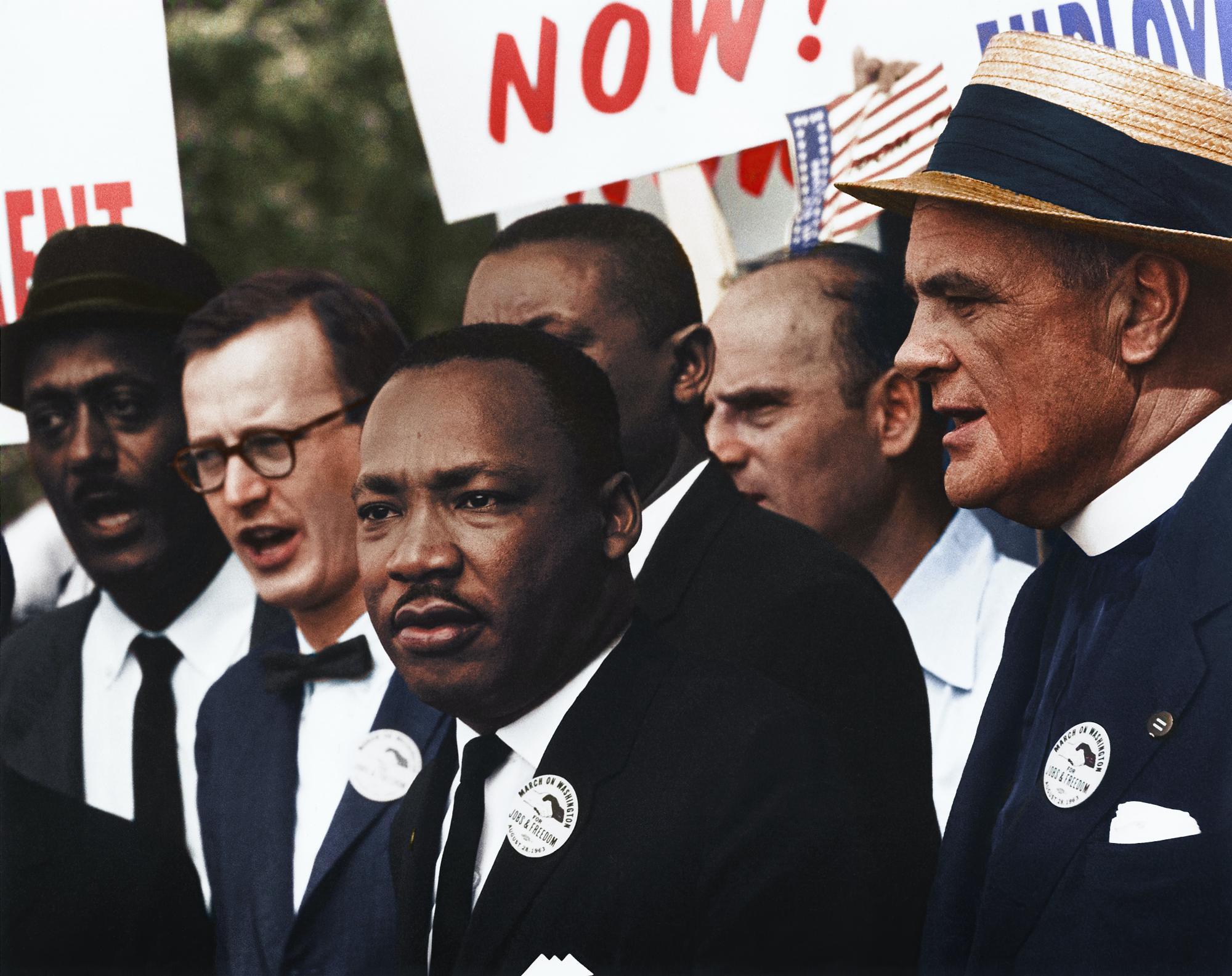
On January 16th, we celebrate Martin Luther King, Jr. Day. This holiday, which falls around the birthday of Dr. King, was first observed in 1986, and only became recognized in all 50 states in 2000. Many people know of Dr. King's work in the civil rights movement of the 1950s and 60s. His "I Have a Dream" speech has been seen in part by many. However, Dr. King was a multifaceted individual who spoke out against the many injustices he witnessed in society, such as poverty, capitalism and the war in Vietnam. He was highly influenced by his Christian faith, but also learned from others, such as the writings of Mahatma Gandhi and Henry David Thoreau's essay on "Civil Disobedience." To learn the whole story of this pastor and leader of the civil rights movement, check out this month's diversity display!
Special thanks to our Materials Processing Coordinator Leah Zande for compiling this list. A physical book display will be available at Hunt Library lobby with the selection rotating weekly.
Featured image: "[Civil Rights March on Washington, D.C. [Dr. Martin Luther King, Jr. and Mathew Ahmann in a crowd.], 8/28/1963" Original black and white negative by Rowland Scherman. Taken August 28th, 1963, Washington D.C, United States (The National Archives and Records Administration). Colorized by Jordan J. Lloyd. U.S. Information Agency. Press and Publications Service. ca. 1953-ca. 1978. https://catalog.archives.gov/id/542015, image gathered by Unseen Histories on Unsplash.
Martin Luther King, Jr.
Ling, Peter J. (2002)
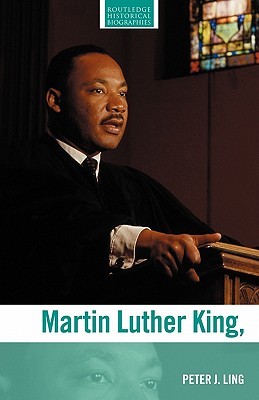 This new biography of the most celebrated African American in history provides a thorough re-examination of both the man and the Civil Rights Movement, showing how King grew into his leadership role and kept his faith when the movement weakened after 1965.
This new biography of the most celebrated African American in history provides a thorough re-examination of both the man and the Civil Rights Movement, showing how King grew into his leadership role and kept his faith when the movement weakened after 1965.
Drawing on recent scholarship on the Civil Rights Movement, this volume condenses research previously only available in larger literature. Peter Ling's crisp and fluent style captures the drama, irony and pathos of King's life and provides an excellent introduction for both students and general readers.
Did Martin Luther King Jr. deserve the praise heaped upon him or was he a media creation, carried along by forces beyond his control? Thanks to Peter Ling's book, students, scholars and researchers will now be able to judge for themselves. - Publisher's Description
Request this Title
Dr. Martin Luther King Jr. and the Poor People's Campaign of 1968
Hamilton, Robert (2020)
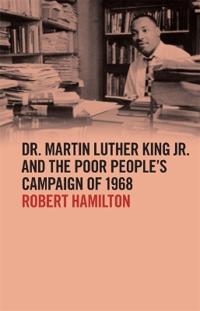 This book introduces new audiences to Dr. Martin Luther King Jr.’s final initiative, the multiracial Poor People’s Campaign (PPC) of 1968. Robert Hamilton depicts the experience of poor people who traveled to Washington in May 1968 to dramatize the issue of poverty by building a temporary city, Resurrection City. His narrative allows us to hear their voices and understand the strategies, objectives, and organization of the campaign. In addition, he highlights the campaign's educational aspect, showing that significant social movements are a means by which societies learn about themselves and framing the PPC as an initiative whose example can teach and inspire current and future generations. The study thus situates Dr. Martin Luther King Jr.’s legacy and teachings in relation to current events and further solidifies Dr. King’s cultural and sociopolitical relevance.
This book introduces new audiences to Dr. Martin Luther King Jr.’s final initiative, the multiracial Poor People’s Campaign (PPC) of 1968. Robert Hamilton depicts the experience of poor people who traveled to Washington in May 1968 to dramatize the issue of poverty by building a temporary city, Resurrection City. His narrative allows us to hear their voices and understand the strategies, objectives, and organization of the campaign. In addition, he highlights the campaign's educational aspect, showing that significant social movements are a means by which societies learn about themselves and framing the PPC as an initiative whose example can teach and inspire current and future generations. The study thus situates Dr. Martin Luther King Jr.’s legacy and teachings in relation to current events and further solidifies Dr. King’s cultural and sociopolitical relevance.
In the decades since 1968, we have seen increasing global inequality leading to greater social polarization, including in the United States. Hamilton offers the insight that the radical politics of Dr. King―as represented in the civil rights and human rights agendas of the PPC―can help us understand and address the challenges of this polarization. Hamilton highlights Dr. King’s commitment to ending poverty and explains why Dr. King’s ideas on this and related issues should be brought to the attention of a wider public who often view him almost exclusively as a civil rights, but not a human rights, leader. - Publisher's Description
Request this Title
Martin Luther King, Jr., and the Theology of Resistance
Burrow, Rufus (2015)
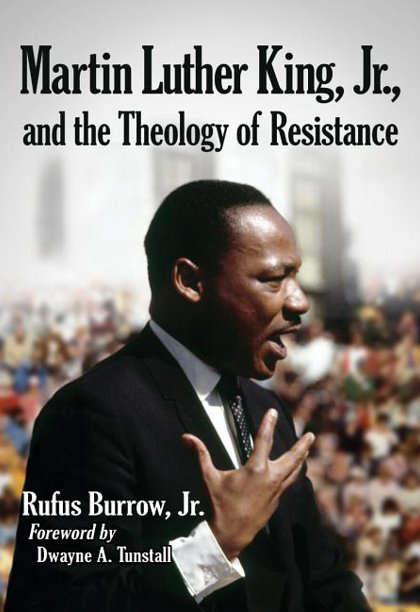 It has been nearly fifty years since Martin Luther King, Jr., was assassinated at the Lorraine Motel in Memphis, Tennessee. Appraisals of King's contributions began almost immediately and continue to this day.
It has been nearly fifty years since Martin Luther King, Jr., was assassinated at the Lorraine Motel in Memphis, Tennessee. Appraisals of King's contributions began almost immediately and continue to this day.
The author explores a great many of King's chief ideas and socio-ethical practices: his concept of a moral universe, his doctrine of human dignity, his belief that not all suffering is redemptive, his brand of personalism, his contribution to the development of social ethics, the inclusion of young people in the movement, sexism as a contradiction to his personalism, the problem of black-on-black violence, and others. The book reveals both the strengths and the limitations in King's theological socio-ethical project, and shows him to have relentlessly applied personalist ideas to organized nonviolent resistance campaigns in order to change the world. - Publisher's Description
Request this Title
Behind the Public Veil: The Humanness of Martin Luther King Jr.
Baldwin, Lewis (2016)
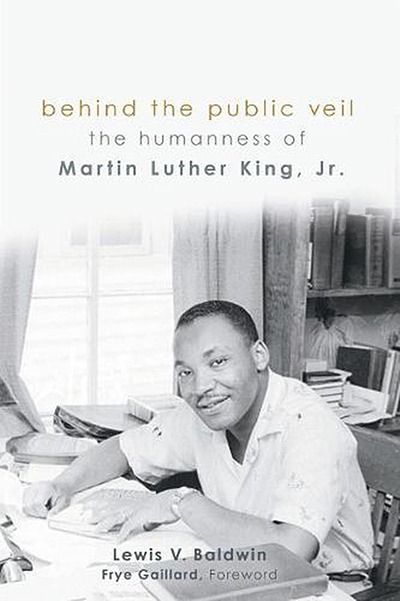 What was Martin Luther King Jr. really like? In this groundbreaking volume, Lewis V. Baldwin answers this question by focusing on the man himself. Drawing on the testimonies of friends, family, and closest associates, this volume adds much-needed biographical background to the discussion, as Baldwin looks beyond all of the mythic, messianic, and iconic images to treat King in terms of his fundamental and vivid humanness. Special attention is devoted to Kings personal insecurities and struggles, his humility and affinity to common people, his delight in pleasant and passionate conversation, his insatiable love for the precious but ordinary things of life, his robust appetite for artfully-prepared and delicious soul food, his enduring appreciation for music and dance, his cheerful and playful attitude and spirit, his abiding interest in games and sports, and his amazing gift of wit, humor, and laughter.
What was Martin Luther King Jr. really like? In this groundbreaking volume, Lewis V. Baldwin answers this question by focusing on the man himself. Drawing on the testimonies of friends, family, and closest associates, this volume adds much-needed biographical background to the discussion, as Baldwin looks beyond all of the mythic, messianic, and iconic images to treat King in terms of his fundamental and vivid humanness. Special attention is devoted to Kings personal insecurities and struggles, his humility and affinity to common people, his delight in pleasant and passionate conversation, his insatiable love for the precious but ordinary things of life, his robust appetite for artfully-prepared and delicious soul food, his enduring appreciation for music and dance, his cheerful and playful attitude and spirit, his abiding interest in games and sports, and his amazing gift of wit, humor, and laughter.
King emerges here as an ordinary human being who enjoyed and celebrated life to the fullest, but was never bigger than life. Here we see the personal qualities of Kingas a real, fleshly human beingand also as a man shaped by his social and cultural experiences and locations. This book reclaims the man behind the mythology. - Publisher's Description
Request this Title
April 4, 1968: Martin Luther King, Jr.'s Death and How it Changed America
Dyson, Michael Eric (2008)
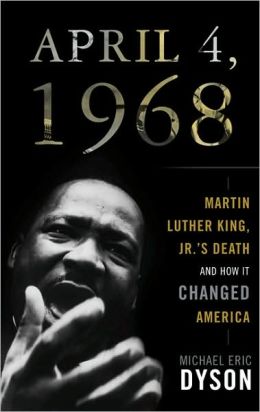 On April 4, 1968, at 6:01 PM, while he was standing on a balcony at a Memphis hotel, Martin Luther King, Jr. was shot and fatally wounded. Only hours earlier King -- the prophet for racial and economic justice in America -- ended his final speech with the words, "I may not get there with you, but I want you to know tonight, that we as a people will get to the Promised Land."
On April 4, 1968, at 6:01 PM, while he was standing on a balcony at a Memphis hotel, Martin Luther King, Jr. was shot and fatally wounded. Only hours earlier King -- the prophet for racial and economic justice in America -- ended his final speech with the words, "I may not get there with you, but I want you to know tonight, that we as a people will get to the Promised Land."
Acclaimed public intellectual and best-selling author Michael Eric Dyson uses the fortieth anniversary of King's assassination as the occasion for a provocative and fresh examination of how King fought, and faced, his own death, and we should use his death and legacy. Dyson also uses this landmark anniversary as the starting point for a comprehensive reevaluation of the fate of Black America over the four decades that followed King's death. Dyson ambitiously investigates the ways in which African-Americans have in fact made it to the Promised Land of which King spoke, while shining a bright light on the ways in which the nation has faltered in the quest for racial justice. He also probes the virtues and flaws of charismatic black leadership that has followed in King's wake, from Jesse Jackson to Barack Obama. Always engaging and inspiring, "April 4, 1968" celebrates the prophetic leadership of Dr. King, and challenges America to renew its commitment to his deeply moral vision. - Publisher's Description
Request this Title
Dangerous Friendship: Stanley Levison, Martin Luther King Jr., and the Kennedy Brothers
Kamin, Ben (2014)
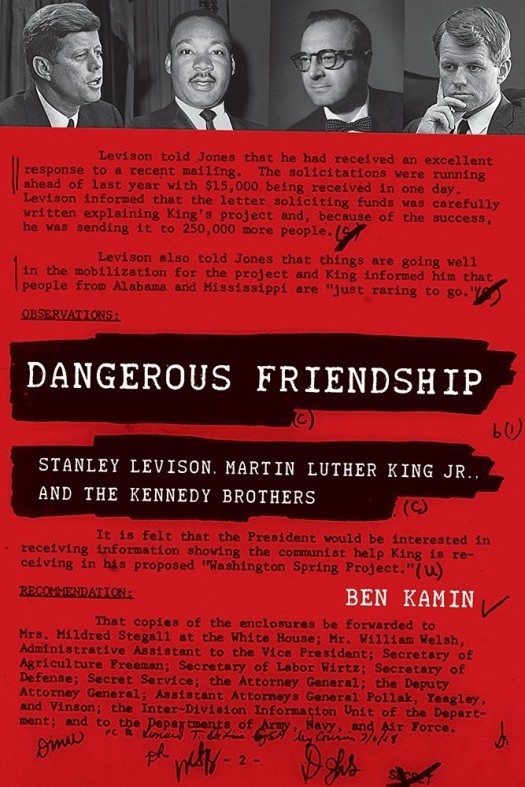 The product of long-concealed FBI surveillance documents, Dangerous Friendship chronicles a history of Martin Luther King Jr. that the government kept secret from the public for years. The book reveals the story of Stanley Levison, a well-known figure in the Communist Party–USA, who became one of King’s closest friends and, effectively, his most trusted adviser. Levison, a Jewish attorney and businessman, became King’s pro bono ghostwriter, accountant, fundraiser, and legal adviser.
The product of long-concealed FBI surveillance documents, Dangerous Friendship chronicles a history of Martin Luther King Jr. that the government kept secret from the public for years. The book reveals the story of Stanley Levison, a well-known figure in the Communist Party–USA, who became one of King’s closest friends and, effectively, his most trusted adviser. Levison, a Jewish attorney and businessman, became King’s pro bono ghostwriter, accountant, fundraiser, and legal adviser.
This friendship, however, created many complications for both men. Because of Levison’s former ties to the Communist Party, FBI director J. Edgar Hoover launched an obsessive campaign, wiretapping, tracking, and photographing Levison relentlessly. By association, King was labeled as “a Communist and subversive,” prompting then–attorney general Robert F. Kennedy to authorize secret surveillance of the civil rights leader. It was this effort that revealed King’s sexual philandering and furthered a breakdown of trust between King, Robert F. Kennedy, and eventually President John F. Kennedy. With stunning revelations, this book exposes both the general attitude of the U.S. government toward the privacy rights of American citizens during those difficult years as well as the extent to which King, Levison, and many other freedom workers were hounded by people at the very top of the U.S. security establishment. - Publisher's Description
Request this Title
Revives my Soul Again: The Spirituality of Martin Luther King Jr.
Baldwin, Lewis V; Anderson, Victor (2018)
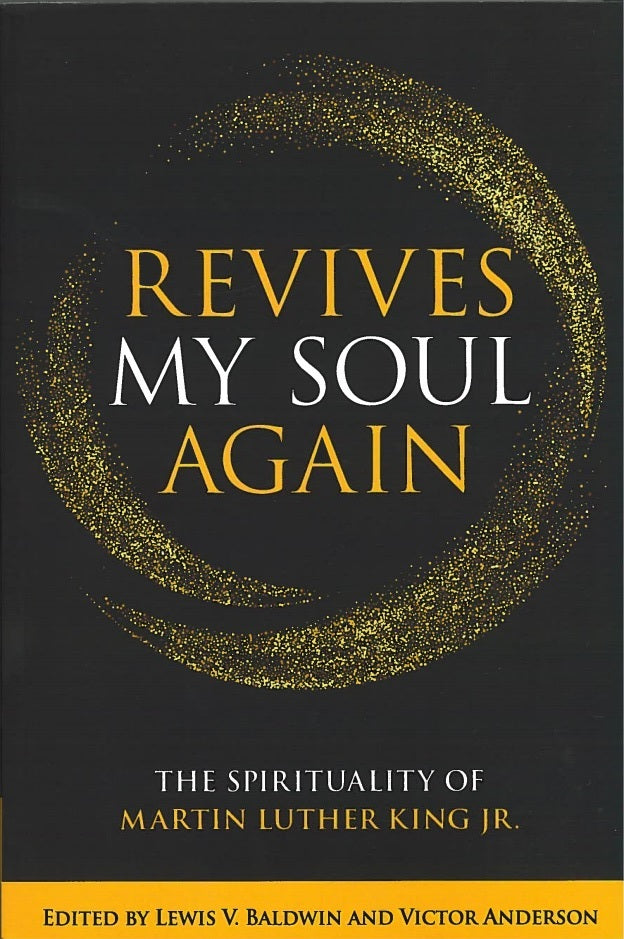 The scholarship on Martin Luther King Jr. is seriously lacking in terms of richly nuanced and revelatory treatments of his spirituality and spiritual life. This book addresses this neglect by focusing on King's life as a paradigm of a deep, vital, engaging, balanced, and contagious spirituality. It shows that the essence of the person King was lies in the quality of his own spiritual journey and how that translated into not only a personal devotional life of prayer, meditation, and fasting but also a public ministry that involved the uplift and empowerment of humanity.
The scholarship on Martin Luther King Jr. is seriously lacking in terms of richly nuanced and revelatory treatments of his spirituality and spiritual life. This book addresses this neglect by focusing on King's life as a paradigm of a deep, vital, engaging, balanced, and contagious spirituality. It shows that the essence of the person King was lies in the quality of his own spiritual journey and how that translated into not only a personal devotional life of prayer, meditation, and fasting but also a public ministry that involved the uplift and empowerment of humanity.
Much attention is devoted to King's spiritual leadership, to his sense of the civil rights movement as "a spiritual movement," and to his efforts to rescue humanity from what he termed a perpetual "death of the spirit." Readers encounter a figure who took seriously the personal, interpersonal, and sociopolitical aspects of the Christian faith, thereby figuring prominently in recasting the very definition of spirituality in his time. King's "holistic spirituality" is presented here with a clarity and power fresh for our own generation. - Publisher's Description
Request this Title
A Child Shall Lead Them
Burrow, Rufus (2014)
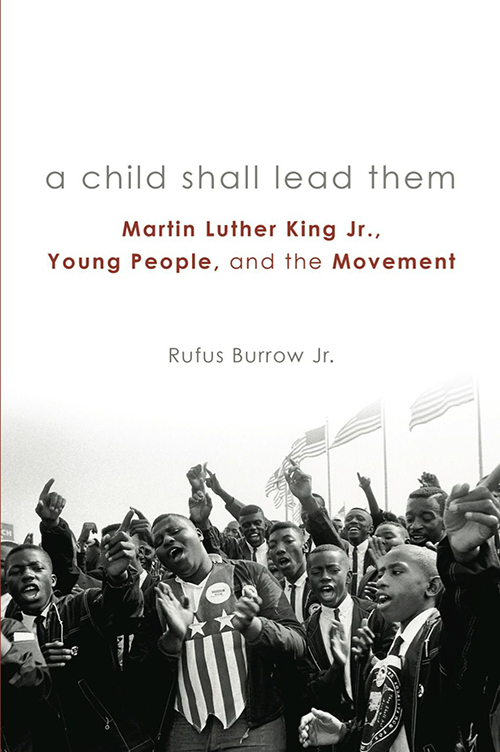 Half a century after some of its most important moments, the assessment of the Civil Rights Era continues. In this exciting volume, Dr. Rufus Burrow turns his attention to a less investigated but critically important byway in this powerful storythe role of children and young people in the Civil Rights Movement.
Half a century after some of its most important moments, the assessment of the Civil Rights Era continues. In this exciting volume, Dr. Rufus Burrow turns his attention to a less investigated but critically important byway in this powerful storythe role of children and young people in the Civil Rights Movement.
What role did young people play, and how did they support the efforts of their elders? What did they seeand what did they do?that their elders were unable to envision? How did children play their part in the liberation of their people?In this project, Burrow reveals the surprising power of youth to change the world. - Publisher's Description
Request this Title
The Power of Unearned Suffering
Edmondson, Mika (2017)
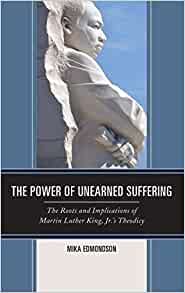 This book explores the roots and relevance of Martin Luther King, Jr.’s approach to black suffering. King’s conviction that “unearned suffering is redemptive” reflects a nearly 250-year-old tradition in the black church going back to the earliest Negro spirituals. From the bellies of slave ships, the foot of the lynching tree, and the back of segregated buses, black Christians have always maintained the hope that God could “make a way out of no way” and somehow bring good from the evils inflicted on them.
This book explores the roots and relevance of Martin Luther King, Jr.’s approach to black suffering. King’s conviction that “unearned suffering is redemptive” reflects a nearly 250-year-old tradition in the black church going back to the earliest Negro spirituals. From the bellies of slave ships, the foot of the lynching tree, and the back of segregated buses, black Christians have always maintained the hope that God could “make a way out of no way” and somehow bring good from the evils inflicted on them.
As a product of the black church tradition, King inherited this widespread belief, developed it using Protestant liberal concepts, and deployed it throughout the Civil Rights Movement of the 50’s and 60’s as a central pillar of the whole non-violent movement. Recently, critics have maintained that King’s doctrine of redemptive suffering creates a martyr mentality which makes victims passive in the face of their suffering; this book argues against that critique. King’s concept offers real answers to important challenges, and it offers practical hope and guidance for how beleaguered black citizens can faithfully engage their suffering today. - Publisher's Description
Request this Title
From Civil Rights to Human Rights
Jackson, Thomas (2007)
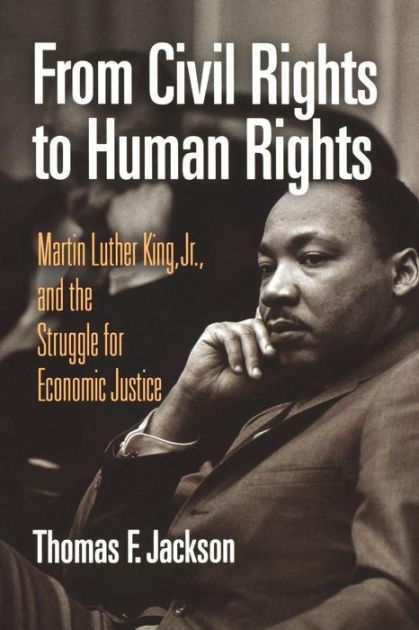 Martin Luther King, Jr., is widely celebrated as an American civil rights hero. Yet King's nonviolent opposition to racism, militarism, and economic injustice had deeper roots and more radical implications than is commonly appreciated, Thomas F. Jackson argues in this searching reinterpretation of King's public ministry. Between the 1940s and the 1960s, King was influenced by and in turn reshaped the political cultures of the black freedom movement and democratic left. His vision of unfettered human rights drew on the diverse tenets of the African American social gospel, socialism, left-New Deal liberalism, Gandhian philosophy, and Popular Front internationalism.
Martin Luther King, Jr., is widely celebrated as an American civil rights hero. Yet King's nonviolent opposition to racism, militarism, and economic injustice had deeper roots and more radical implications than is commonly appreciated, Thomas F. Jackson argues in this searching reinterpretation of King's public ministry. Between the 1940s and the 1960s, King was influenced by and in turn reshaped the political cultures of the black freedom movement and democratic left. His vision of unfettered human rights drew on the diverse tenets of the African American social gospel, socialism, left-New Deal liberalism, Gandhian philosophy, and Popular Front internationalism.
King's early leadership reached beyond southern desegregation and voting rights. As the freedom movement of the 1950s and early 1960s confronted poverty and economic reprisals, King championed trade union rights, equal job opportunities, metropolitan integration, and full employment. When the civil rights and antipoverty policies of the Johnson administration failed to deliver on the movement's goals of economic freedom for all, King demanded that the federal government guarantee jobs, income, and local power for poor people. When the Vietnam war stalled domestic liberalism, King called on the nation to abandon imperialism and become a global force for multiracial democracy and economic justice.
Drawing widely on published and unpublished archival sources, Jackson explains the contexts and meanings of King's increasingly open call for "a radical redistribution of political and economic power" in American cities, the nation, and the world. The mid-1960s ghetto uprisings were in fact revolts against unemployment, powerlessness, police violence, and institutionalized racism, King argued. His final dream, a Poor People's March on Washington, aimed to mobilize Americans across racial and class lines to reverse a national cycle of urban conflict, political backlash, and policy retrenchment. King's vision of economic democracy and international human rights remains a powerful inspiration for those committed to ending racism and poverty in our time. - Publisher's Description
Request this Title
To Shape a New World
Shelby, Tommie; Terry, Brandon (2007)
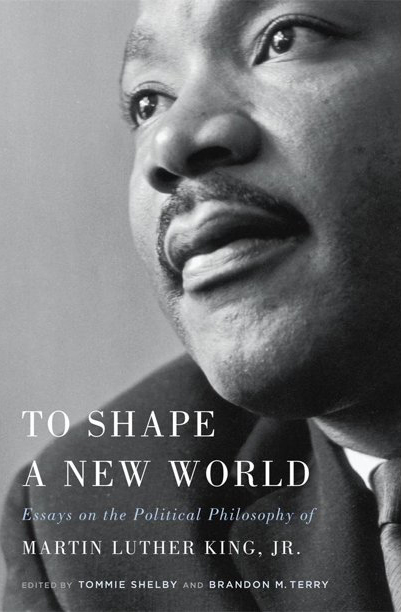 Martin Luther King, Jr., may be America’s most revered political figure, commemorated in statues, celebrations, and street names around the world. On the fiftieth anniversary of King’s assassination, the man and his activism are as close to public consciousness as ever. But despite his stature, the significance of King’s writings and political thought remains underappreciated.
Martin Luther King, Jr., may be America’s most revered political figure, commemorated in statues, celebrations, and street names around the world. On the fiftieth anniversary of King’s assassination, the man and his activism are as close to public consciousness as ever. But despite his stature, the significance of King’s writings and political thought remains underappreciated.
In "To Shape a New World," Tommie Shelby and Brandon Terry write that the marginalization of King’s ideas reflects a romantic, consensus history that renders the civil rights movement inherently conservative―an effort not at radical reform but at “living up to” enduring ideals laid down by the nation’s founders. On this view, King marshaled lofty rhetoric to help redeem the ideas of universal (white) heroes, but produced little original thought. This failure to engage deeply and honestly with King’s writings allows him to be conscripted into political projects he would not endorse, including the pernicious form of “color blindness” that insists, amid glaring race-based injustice, that racism has been overcome.
Cornel West, Danielle Allen, Martha Nussbaum, Robert Gooding-Williams, and other authors join Shelby and Terry in careful, critical engagement with King’s understudied writings on labor and welfare rights, voting rights, racism, civil disobedience, nonviolence, economic inequality, poverty, love, just-war theory, virtue ethics, political theology, imperialism, nationalism, reparations, and social justice. In King’s exciting and learned work, the authors find an array of compelling challenges to some of the most pressing political dilemmas of our present, and rethink the legacy of this towering figure. - Publisher's Description
Request this Title
I Have a Dream
Adelman, Bob (2014)
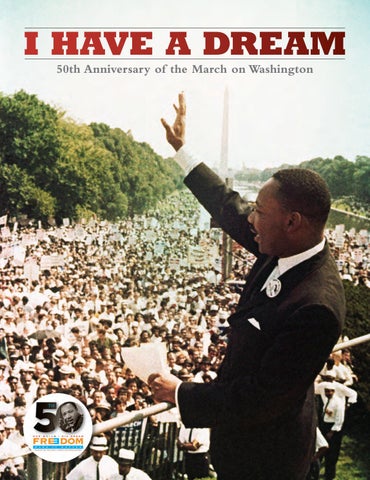 On August 28, 1963, something quite amazing occurred. On that day, one of the largest political rallies ever took place in support of civil and economic rights of African-Americans, and Dr. Martin Luther King, Jr., standing in front of the Lincoln Memorial, gave one of the most stirring speeches in history when he delivered his “I Have a Dream” speech.
On August 28, 1963, something quite amazing occurred. On that day, one of the largest political rallies ever took place in support of civil and economic rights of African-Americans, and Dr. Martin Luther King, Jr., standing in front of the Lincoln Memorial, gave one of the most stirring speeches in history when he delivered his “I Have a Dream” speech.
This book is a celebration of the 50th anniversary of this address and includes narrative and more than 100 stunning photos from the march in Birmingham, Alabama, through the March on Washington. The photographs come from Bob Adelman, one of the most notable photographers of this movement. His work has been featured in Time, Newsweek, and the Associated Press. It is authored by the Southern Christian Leadership Conference (SCLC), an organization in which Dr. King served as the first president. - Publisher's Description
Request this Title
Misremembering Dr. King
Yanco, Jennifer (2014)
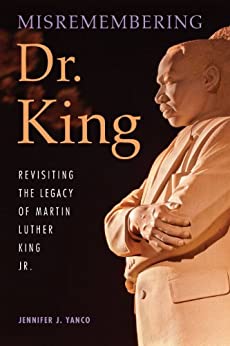 We all know the name. Martin Luther King Jr., the great American civil rights leader. But most people today know relatively little about King, the campaigner against militarism, materialism, and racism―what he called the "giant triplets." Jennifer J. Yanco takes steps to redress this imbalance.
We all know the name. Martin Luther King Jr., the great American civil rights leader. But most people today know relatively little about King, the campaigner against militarism, materialism, and racism―what he called the "giant triplets." Jennifer J. Yanco takes steps to redress this imbalance.
"My objective is to highlight the important aspects of Dr. King's work which have all but disappeared from popular memory, so that more of us can really 'see' King." After briefly telling the familiar story of King's civil rights campaigns and accomplishments, she considers the lesser-known concerns that are an essential part of his legacy. Yanco reminds us that King was a strong critic of militarism who argued that the United States should take the lead in promoting peaceful solutions rather than imposing its will through military might; that growing materialism and an ethos of greed was damaging the moral and spiritual health of the country; and that in a nation where racism continues unabated, white Americans need to educate themselves about racism and its history and take their part in the weighty task of dismantling it. - Publisher's Description
Request this Title
Reclaiming the Great World House
Crawford, Vicki; Baldwin, Lewis (2019)
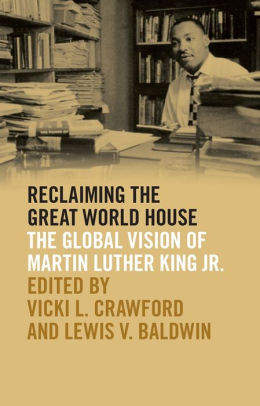 The burgeoning terrain of Martin Luther King Jr. studies is leading to a new appreciation of his thought and its meaningfulness for the emergence and shaping of the twenty-first-century world. This volume brings together an impressive array of scholars from various backgrounds and disciplines to explore the global significance of King―then, now, and in the future. Employing King’s metaphor of “the great world house,” the major focus is on King’s appraisal of the global-human struggle in the 1950s and 1960s, his relevance for today’s world, and how future generations might constructively apply or appropriate his key ideas and values in addressing racism, poverty and economic injustice, militarism, sexism, homophobia, the environmental crisis, globalization, and other challenges confronting humanity today. The contributors treat King in context and beyond context, taking seriously the historical King while also exploring how his name, activities, contributions, and legacy are still associated with a globalized rights culture. - Publisher's Description
The burgeoning terrain of Martin Luther King Jr. studies is leading to a new appreciation of his thought and its meaningfulness for the emergence and shaping of the twenty-first-century world. This volume brings together an impressive array of scholars from various backgrounds and disciplines to explore the global significance of King―then, now, and in the future. Employing King’s metaphor of “the great world house,” the major focus is on King’s appraisal of the global-human struggle in the 1950s and 1960s, his relevance for today’s world, and how future generations might constructively apply or appropriate his key ideas and values in addressing racism, poverty and economic injustice, militarism, sexism, homophobia, the environmental crisis, globalization, and other challenges confronting humanity today. The contributors treat King in context and beyond context, taking seriously the historical King while also exploring how his name, activities, contributions, and legacy are still associated with a globalized rights culture. - Publisher's Description
Request this Title
Confluence of Thought: Mahatma Gandhi and Martin Luther King, Jr.
Chakrabarty, Bidyut; Carson, Clayborne (2013)
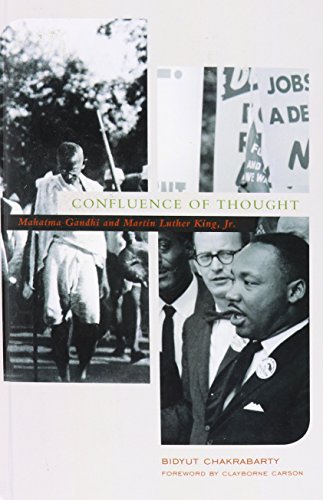 While much has been written about the Mahatma Gandhi and Martin Luther King, Jr., never before has anyone compared the social and political origins and evolution of their thoughts on non-violence. In this path-breaking work, Bidyut Chakrabarty argues that there is a confluence between Gandhi and King's concerns for humanity and advocacy of non-violence, despite the very different historical, economic and cultural circumstances against which they developed their ideas. At the same time, he demonstrates that both thinkers were truly shaped by their historical moments, evolving their approaches to non-violence to best advance their respective struggles for freedom.
While much has been written about the Mahatma Gandhi and Martin Luther King, Jr., never before has anyone compared the social and political origins and evolution of their thoughts on non-violence. In this path-breaking work, Bidyut Chakrabarty argues that there is a confluence between Gandhi and King's concerns for humanity and advocacy of non-violence, despite the very different historical, economic and cultural circumstances against which they developed their ideas. At the same time, he demonstrates that both thinkers were truly shaped by their historical moments, evolving their approaches to non-violence to best advance their respective struggles for freedom.
Gandhi and King were perhaps the most influential individuals in modern history to combine religious and political thought into successful and dynamic social ideologies. Gandhi emphasized service to humanity while King, who was greatly influenced by Gandhi, pursued religion-driven social action. Chakrabarty looks particularly at the way in which each strategically used religious and political language to build momentum and attract followers to their movements. The result is a compelling and historically entrenched view of two of the most important figures of the twentieth century and a thoughtful meditation on the common threads that flow through the larger and enduring nonviolence movement. - Publisher's Description
Request this Title
Selma to Saigon
Lucks, Daniel S. (2014)
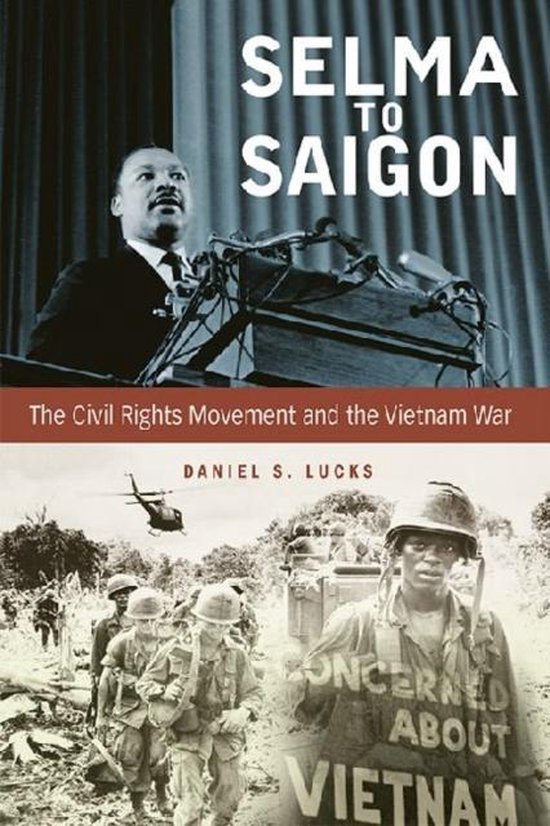 The civil rights and anti–Vietnam War movements were the two greatest protests of twentieth-century America. The dramatic escalation of U.S. involvement in Vietnam in 1965 took precedence over civil rights legislation, which had dominated White House and congressional attention during the first half of the decade. The two issues became intertwined on January 6, 1966, when the Student Nonviolent Coordinating Committee (SNCC) became the first civil rights organization to formally oppose the war, protesting the injustice of drafting African Americans to fight for the freedom of the South Vietnamese people when they were still denied basic freedoms at home.
The civil rights and anti–Vietnam War movements were the two greatest protests of twentieth-century America. The dramatic escalation of U.S. involvement in Vietnam in 1965 took precedence over civil rights legislation, which had dominated White House and congressional attention during the first half of the decade. The two issues became intertwined on January 6, 1966, when the Student Nonviolent Coordinating Committee (SNCC) became the first civil rights organization to formally oppose the war, protesting the injustice of drafting African Americans to fight for the freedom of the South Vietnamese people when they were still denied basic freedoms at home.
"Selma to Saigon" explores the impact of the Vietnam War on the national civil rights movement. Before the war gained widespread attention, the New Left, the SNCC, and the Congress of Racial Equality (CORE) worked together to create a biracial alliance with the potential to make significant political and social gains in Washington. Contention over the war, however, exacerbated preexisting generational and ideological tensions that undermined the coalition, and Lucks analyzes the causes and consequences of this disintegration.
This powerful narrative illuminates the effects of the Vietnam War on the lives of leaders such as Whitney Young Jr., Stokely Carmichael, Roy Wilkins, Bayard Rustin, and Martin Luther King Jr., as well as other activists who faced the threat of the military draft along with race-related discrimination and violence. Providing new insights into the evolution of the civil rights movement, this book fills a significant gap in the literature about one of the most tumultuous periods in American history. - Publisher's Description
Request this Title
Ring Out Freedom!
Sunnemark, Fredrik (2004)
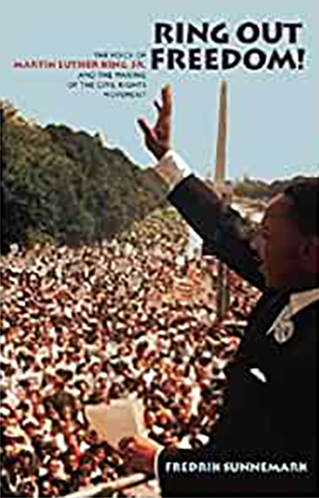 Martin Luther King, Jr. was more than the civil rights movement’s most visible figure, he was its voice. This book describes what went into the creation of that voice. It explores how King used words to define a movement. From a place situated between two cultures of American society, King shaped the language that gave the movement its identity and meaning.
Martin Luther King, Jr. was more than the civil rights movement’s most visible figure, he was its voice. This book describes what went into the creation of that voice. It explores how King used words to define a movement. From a place situated between two cultures of American society, King shaped the language that gave the movement its identity and meaning.
Fredrik Sunnemark shows how materialistic, idealistic, and religious ways of explaining the world coexisted in King’s speeches and writings. He points out the roles of God, Jesus, the church, and "the Beloved Community" in King’s rhetoric. Sunnemark examines King’s use of allusions, his strategy of employing different meanings of key ideas to speak to different members of his audience, and the way he put into play international ideas and events to achieve certain rhetorical goals. The book concludes with an analysis of King’s development after 1965, examining the roots, content, and consequences of his so-called radicalization. - Publisher's Description
Request this Title
Martin Luther King Jr., Heroism, and African American Literature
Harris, Trudier (2014)
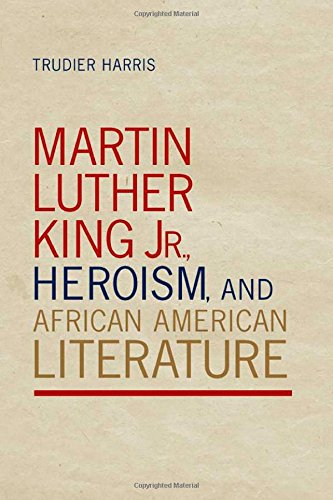 African American writers have incorporated Martin Luther King Jr. into their work since he rose to prominence in the mid-1950s. "Martin Luther King Jr., Heroism, and African American Literature" is a study by award-winning author Trudier Harris of King’s character and persona as captured and reflected in works of African American literature continue to evolve.
African American writers have incorporated Martin Luther King Jr. into their work since he rose to prominence in the mid-1950s. "Martin Luther King Jr., Heroism, and African American Literature" is a study by award-winning author Trudier Harris of King’s character and persona as captured and reflected in works of African American literature continue to evolve.
One of the most revered figures in American history, King stands above most as a hero. His heroism, argues Harris, is informed by African American folk cultural perceptions of heroes. Brer Rabbit, John the Slave, Stackolee, and Railroad Bill—folk heroes all—provide a folk lens through which to view King in contemporary literature. Ambiguities and issues of morality that surround trickster figures also surround King. Nonconformist traits that define Stackolee and Railroad Bill also inform King’s life and literary portraits. Defiance of the law, uses of indirection, moral lapses, and bad habits are as much a part of the folk-transmitted biography of King as they are a part of writers’ depictions of him in literary texts.
Harris first demonstrates that during the Black Arts Movement of the 1960s, when writers such as Nikki Giovanni, Sonia Sanchez, and LeRoi Jones (Amiri Baraka) were rising stars in African American poetry, King’s philosophy of nonviolence was out of step with prevailing notions of militancy (Black Power), and their literature reflected that division.
In the quieter times of the 1970s and 1980s and into the twenty-first century, however, treatments of King and his philosophy in African American literature changed. Writers who initially rejected him and nonviolence became ardent admirers and boosters, particularly in the years following his assassination. By the 1980s, many writers skeptical about King had reevaluated him and began to address him as a fallen hero. To the most recent generation of writers, such as Katori Hall, King is fair game for literary creation, no matter what those portrayals may reveal, to a point where King has become simply another source of reference for creativity.
Collectively these writers, among many others, illustrate that Martin Luther King Jr. provides one of the strongest influences upon the creative worlds of multiple generations of African American writers of varying political and social persuasions. - Publisher's Description
Request this Title
King Me
Sibley, Clinnesha (2014)
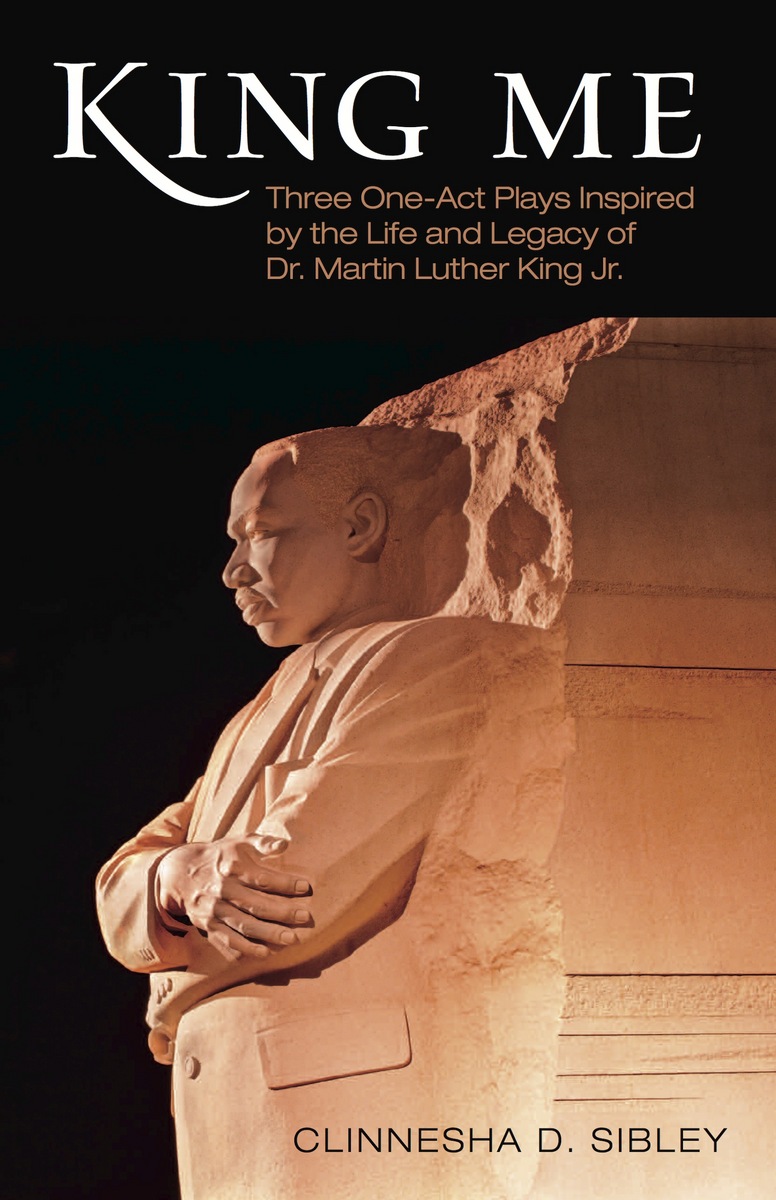 A trio of short dramas set in the South and spanning 1968 to the present, "King Me" features compelling characters and relevant themes that examine our ongoing understanding of Dr. Martin Luther King Jr. Bound by Blood, #communicate, and Paradox in the Parish richly dramatize three of King's popular quotes, offering creative methods for teaching history and social studies and setting the stage for inspiring discussions for contemporary theater goers.
A trio of short dramas set in the South and spanning 1968 to the present, "King Me" features compelling characters and relevant themes that examine our ongoing understanding of Dr. Martin Luther King Jr. Bound by Blood, #communicate, and Paradox in the Parish richly dramatize three of King's popular quotes, offering creative methods for teaching history and social studies and setting the stage for inspiring discussions for contemporary theater goers.
Readers and audiences will also learn about current civil rights issues such as the Jena Six Case in Jena, Louisiana, while appreciating, or appreciating anew, how King impacted the lives of his own and future generations. - Publisher's Description
Request this Title
A Catalog of Music Written in Honor of Martin Luther King, Jr.
McDonald, Anthony (2012)
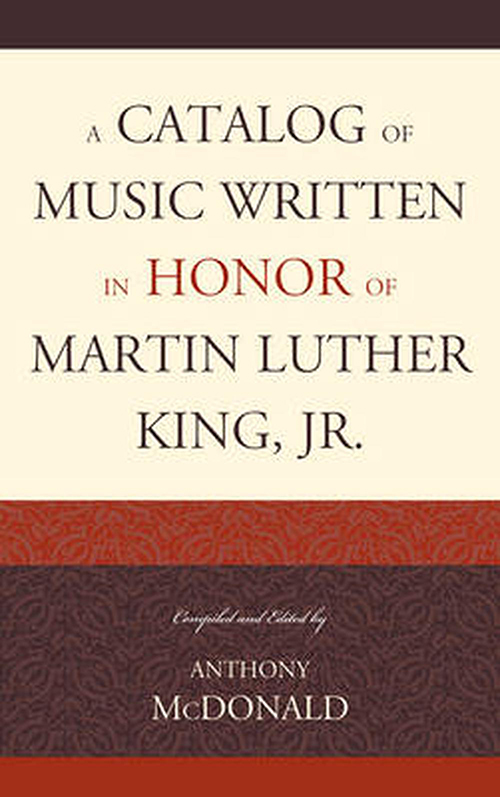 In 1983, Ronald Reagan signed into law a federal holiday to honor Martin Luther King, Jr. Three years later, the holiday was first formally observed by the federal government. In response to the growing number of musical celebrations surrounding the holiday, Anthony McDonald published in 1996 the first edition of The Catalog of Music Written in Honor of Martin Luther King, Jr. Now, more than a decade since its second edition in 1999, McDonald presents his definitive third edition of the catalog.
In 1983, Ronald Reagan signed into law a federal holiday to honor Martin Luther King, Jr. Three years later, the holiday was first formally observed by the federal government. In response to the growing number of musical celebrations surrounding the holiday, Anthony McDonald published in 1996 the first edition of The Catalog of Music Written in Honor of Martin Luther King, Jr. Now, more than a decade since its second edition in 1999, McDonald presents his definitive third edition of the catalog.
McDonald organizes information on music suitable for concert performances by symphony orchestras, school music departments, church choirs, or solo performers, including works that celebrate not only Martin Luther King Day, but Black History Month as well. His selections comprise musical work written to honor King, as well as other Americans engaged in the struggle for equality and freedom such as Abraham Lincoln, Malcolm X, Harriet Tubman, Frederick Douglass, and John F. Kennedy. McDonald also incorporates works that more broadly address African American history and culture, such as William Grant Still’s Afro-American Symphony. This third edition contains a considerable number of revisions, updates, and new work and includes entirely new sections devoted to jazz and blues songs, sample programs of Martin Luther King, Jr. Day concerts, and a discography, along with appendixes of works listed by orchestration, subject, and a list of publishers and sources.
"A Catalog of Music Written in Honor of Martin Luther King Jr." is the ideal tool for symphony orchestras, choruses, music departments, and other performing groups and organizations seeking to present concerts that celebrate Martin Luther King Jr., his legacy, and African American history more broadly. - Publisher's Description
Request this Title
